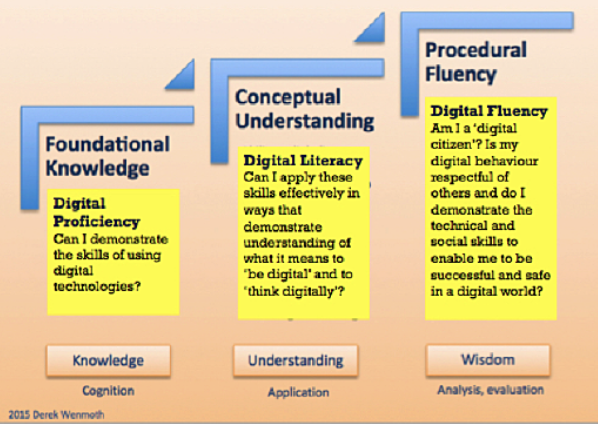What is digital fluency?
by Karen Spencer
‘Fluency’ derives from the word ‘flow’ and when we think about being ‘fluent’ in any context, it refers to being flexible, accurate, efficient, and appropriate. In other words, the way we use skills, language, and speech flows naturally and easily. In a digital context for learning, fluency involves using technologies “readily and strategically to learn, to work, and to play, and the infusion of technology in teaching and learning to improve outcomes for all students.”
Broadly speaking, digital fluency is a combination of:
digital, or technical, proficiency: able to understand, select, and use the technologies and technological systems;
digital literacy: cognitive or intellectual competencies, which include being able to read, create, evaluate, make judgements, and apply technical skills while doing so;
social competence, or dispositional knowledge: the ability to relate to others and communicate with them effectively.
It is helpful to think of fluency as showing wisdom and confidence in the application and use of digital technologies, as reflected in the diagram below (Wenmoth, 2015):
Internationally, there is currently no consistently held definition of digital fluency, and at times it is used interchangeably by different jurisdictions. Other phrases appear to be used in its place such as ICT fluency; Digital literacies; Digital competence; Digital citizenship. We often see it broken down into lists and competencies. In some contexts, it is even defined as a separate set of competencies or curriculum (White, 2013).
“Fluency” is broader than “literacy.”
Being ‘digitally literate’ means acquiring the skills to make and create meaning, and select technologies to do so. Being fluent requires competencies and capabilities that go beyond the skill level. Someone who is digitally fluent not only selects tools and knows what to do with them, but can explain why they work in the way they do and how they might adapt what they do if the context were to change.
For example, if you are literate, you might be able to follow instructions to set up a shared document online and use it for a clear purpose. If you are fluent, you can self-select from a range of tools to achieve the same outcome, navigate collaborative spaces effectively and confidently with other people.
Fluency represents the highest order – that of ‘unconscious competence’ – in the ‘hierarchy of competence’ that we see in models such as Burch:
Image source: Competence Hierarchy adapted from Noel Burch by Igor Kokcharov CC BY-SA 4.0
Digital fluency can also be considered as part of a broader set of competencies related to ‘21st century’ learning. Being able to manipulate technologies so we can create and navigate information successfully is supported by our ability to work collaboratively, solve real-world problems creatively, pursue our own learning goals, and so on.
Why we all need to be digitally fluent
Crucially, the outcome of being digitally fluent relates to issues of responsibility, equity, and access. We all have the right to fully participate in a digitally-enabled education system and in an increasingly digitised society. If we work with fluency in the way we use technologies, we are able to keep ourselves safe online and take full advantage of opportunities such as being able to apply for work, manage our finances, or be part of our local community.
“In the years ahead, digital fluency will become a prerequisite for obtaining jobs, participating meaningfully in society, and learning throughout a lifetime. (Resnick, 2002, p. 33) [via White, 2013]”
As more services — health, civil, safety, even voting — move online, it has never been more important to ensure citizens are not disenfranchised from accessing services that are central to the well-being of all.
About the Author
Karen Spencer is the Deputy Principal and Lead Principal for the Capital City Kāhui Ako in Wellington City, New Zealand.


